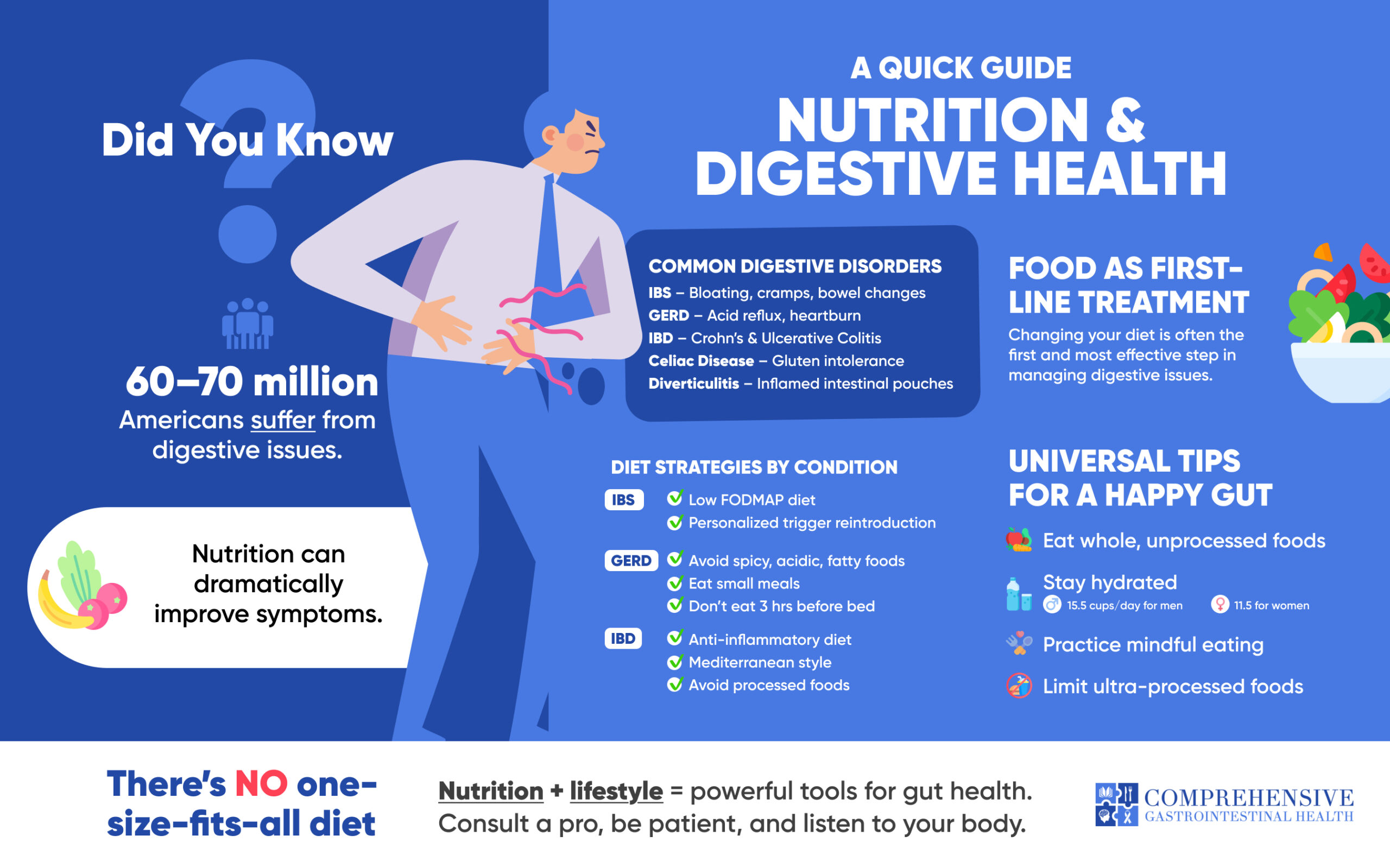Nutritional Approaches to Common Digestive Disorders

Are you among the millions of Americans struggling with digestive discomfort?
Approximately 60-70 million people in the United States experience digestive issues, according to the National Institute of Diabetes and Digestive and Kidney Diseases (NIDDK). Many don’t realize that proper nutrition can significantly improve their symptoms.
This comprehensive guide explores how dietary changes can help manage common digestive disorders and improve your quality of life.

Understanding Common Digestive Disorders
Digestive disorders encompass a wide range of conditions that affect the gastrointestinal (GI) tract. Some of the most prevalent include Irritable Bowel Syndrome (IBS), characterized by abdominal pain, bloating, and altered bowel habits; Gastroesophageal Reflux Disease (GERD), when stomach acid frequently flows back into the esophagus; Inflammatory Bowel Disease (IBD), which includes Crohn’s disease and ulcerative colitis; Celiac Disease, an immune reaction to eating gluten; and Diverticulitis, inflammation or infection in small pouches in the digestive tract.
These conditions can significantly impact daily life, affecting everything from work productivity to personal relationships. However, nutrition plays a crucial role in managing and sometimes even preventing symptoms of these conditions.
Nutrition as a First-Line Treatment
Before reaching for medication, many gastroenterologists now recommend dietary modifications as a first approach to managing digestive issues. This shift in treatment paradigm is supported by growing evidence that what we eat directly influences our gut health and symptom severity.
The Gut Microbiome Connection
Your digestive tract houses trillions of bacteria that make up your gut microbiome. This complex ecosystem influences digestion, immune function, and even mood. A 2021 review in the European Journal of Nutrition demonstrated that dietary patterns dramatically affect which bacterial species thrive in your gut, with potential downstream effects on digestive symptoms.
Research shows that a diverse, balanced gut microbiome correlates with better digestive health and fewer symptoms of common digestive disorders. A study from the Harvard T.H. Chan School of Public Health found that individuals adhering to specific dietary guidelines had a significantly lower risk of developing GERD symptoms.

Dietary Approaches for Specific Digestive Disorders
IBS: The Low FODMAP Approach
For irritable bowel syndrome, one of the most researched dietary interventions is the low FODMAP diet. FODMAPs (Fermentable Oligosaccharides, Disaccharides, Monosaccharides, and Polyols) are types of carbohydrates that can trigger digestive symptoms in sensitive individuals.
According to a systematic review published in the earlier referenced study conducted by the European Journal of Nutrition, following a low FODMAP diet reduces symptoms in approximately 50% to 80% of IBS patients. The approach involves an elimination phase where high-FODMAP foods like onions, garlic, wheat, and certain fruits are temporarily removed from the diet. This is followed by a systematic reintroduction to identify personal triggers, and finally, a personalization phase is created where a sustainable, balanced diet avoids only problematic foods.
This isn’t a forever diet but rather a diagnostic tool to identify your unique triggers. Specialized IBS nutritional programs help patients identify their food triggers and develop sustainable eating patterns that minimize symptoms.
GERD: Anti-Reflux Nutrition
Gastroesophageal reflux disease (GERD) is one of the most common digestive disorders we treat, and in many cases, nutrition plays a critical role in symptom control. Clinical guidelines from the American College of Gastroenterology emphasize the importance of identifying and avoiding dietary triggers, which commonly include chocolate, caffeine, alcohol, spicy dishes, acidic foods, and high-fat meals. Strategic meal timing is equally important; eating smaller portions more frequently and avoiding food intake within three hours of lying down can significantly reduce reflux episodes.
Lifestyle and nutrition interventions can be powerful tools. Research published in the National Library of Medicine highlights that patients adhering to a reflux-conscious diet—combined with weight management and positional strategies such as elevating the head of the bed—may see meaningful symptom reduction without relying solely on medication.
For individuals with persistent or complex reflux, we offer an integrative reflux management program that blends advanced nutritional planning with medically validated therapies to help restore long-term digestive comfort.
IBD: Anti-Inflammatory Eating
Inflammatory bowel diseases like Crohn’s and ulcerative colitis benefit from anti-inflammatory nutrition approaches. While diet can’t cure IBD, it can help manage symptoms and potentially extend periods of remission.
Beneficial strategies include following a Mediterranean-style diet rich in omega-3 fatty acids from fatty fish, olive oil, and walnuts. Consuming soluble fiber from oats, psyllium, and certain well-cooked vegetables during remission has also shown benefit in clinical studies. Many patients find symptom relief by avoiding processed foods, added sugars, and artificial ingredients.
Some patients with IBD may benefit from structured elimination diets like the Specific Carbohydrate Diet (SCD) under medical supervision. A study in the Journal of Clinical Gastroenterology found that SCD adherence was associated with improved symptoms and inflammatory markers in some patients with Crohn’s disease.

Universal Nutrition Principles for Digestive Health
While each digestive disorder has specific dietary considerations, some nutrition principles benefit nearly all gut conditions based on current research evidence.
Prioritize Whole, Unprocessed Foods
The standard American diet, high in processed foods, contributes to poor digestive health, according to numerous epidemiological studies. Instead, focus on fresh vegetables and fruits (prepared appropriately for your condition), lean proteins, healthy fats from olive oil, avocados, and nuts, and whole grains (if tolerated). These foods provide essential nutrients without the additives and preservatives that can irritate the digestive system.
A 2024 study in BMJ revealed that ultra-processed food consumption was significantly associated with negative outcomes in 32 out of 45 health parameters (71%), including increased risk across mortality, cancer, and various health conditions affecting mental, respiratory, cardiovascular, gastrointestinal, and metabolic systems.
Hydration Matters
Adequate fluid intake is crucial for digestive health. Proper hydration helps maintain the mucus lining of the intestines, supports regular bowel movements, and aids in nutrient absorption. The Mayo Clinic states that the U.S. National Academies of Sciences, Engineering, and Medicine determined that an adequate daily fluid intake is about 15.5 cups (3.7 liters) of fluids a day for men and about 11.5 cups (2.7 liters) of fluids a day for women. Patients with specific conditions like IBS-D (diarrhea-predominant) may need to be mindful of when they consume fluids relative to meals.
Mindful Eating Practices
How you eat can be as important as what you eat. Avoiding distractions during meals, listening to hunger and fullness cues, and managing stress through meditation or deep breathing before eating can all support optimal digestion by activating your parasympathetic nervous system—the “rest and digest” mode.
When to Seek Professional Guidance
While nutrition can powerfully impact digestive health, it’s important to work with healthcare professionals rather than self-diagnosing. The American Gastroenterological Association recommends consulting a gastroenterologist if you experience persistent or severe abdominal pain, blood in stool, unexplained weight loss, chronic diarrhea or constipation, or difficulty swallowing.
A qualified gastroenterologist can provide proper diagnosis and create a personalized treatment plan that may include dietary modifications alongside other interventions. This is particularly important because some digestive symptoms can mimic each other, and proper testing is essential for appropriate treatment.
Your Nutrition Journey
Managing common digestive disorders through nutrition isn’t about following a one-size-fits-all diet. It’s about discovering your body’s unique needs and triggers. The journey requires patience, experimentation, and often professional guidance.
Remember that nutrition is just one aspect of managing digestive health. Regular physical activity, stress management, adequate sleep, and sometimes medication all play important roles in your overall digestive wellness.
